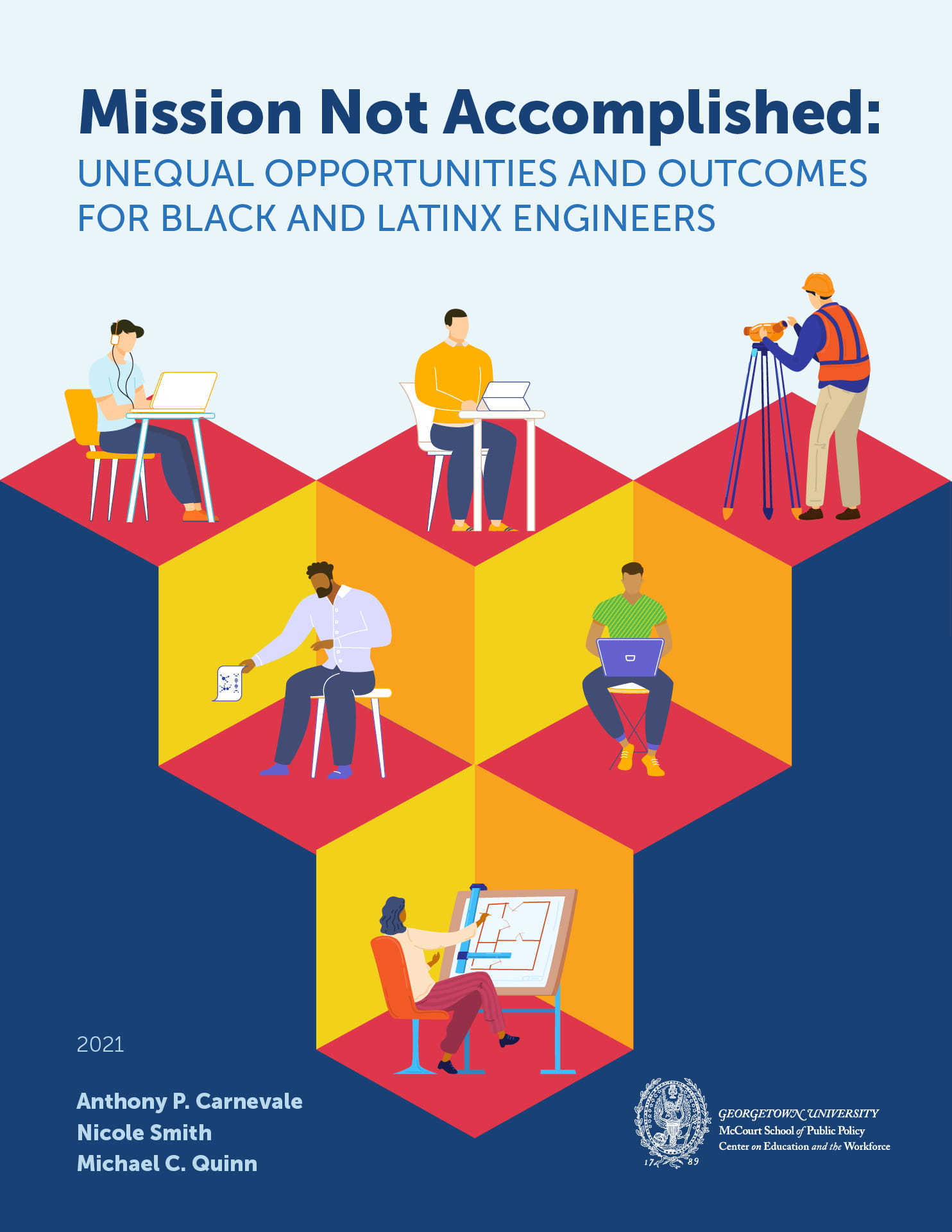Mission Not Accomplished
Unequal Opportunities and Outcomes for Black and Latinx Engineers
Summary
Engineering occupations are some of the highest-paying and most prestigious in the US labor market, but they are also some of the least diverse. Mission Not Accomplished: Unequal Opportunities and Outcomes for Black and Latinx Engineers finds that of the nearly 1.7 million prime-age engineering workers in the United States in 2019, 81% were either White or Asian/Asian American, and 84% were men. A mere 3% of engineers working in the field in 2019 were either Black/African American or Latinx women.
Source: Georgetown University Center on Education and the Workforce analysis of data from the American Community Survey (ACS), 2009–2019.
Note: Restricted to prime-age adults (ages 25–54). Values may not sum to 100 percent due to rounding.
Achieving Racial Equity in Engineering Could Take 76 Years for all Black/African American and Latinx Workers and up to 256 Years for Black/African American Workers Alone
Between 1990 and 2019, the total number of Black/African American and Latinx students who graduated with a bachelor’s degree in engineering increased nearly four-fold, but there is still far from equitable representation.
Source: Georgetown University Center on Education and the Workforce analysis of data from the Integrated Postsecondary Data System (IPEDS), 1989–90, and 2018–19.
Note: Values may not sum to 100 percent due to rounding.
* Asian/PI includes Asian and Pacific Islander students.
The “Other” category is not comparable between years. The category included American Indians in 1990 and American Indians as well as multiracial people in 2019.
Engineering Pays Well
Engineering bachelor’s degree holders (no graduate degree) earn 25% more on average than the typical bachelor’s degree holder in the first job after graduation. Specialized engineering degrees pay even better, For example, a degree in petroleum engineering pays an average of $106,000, which is 90% more than the average bachelor’s degree holder and up to 125% more than those with low-paying bachelor’s degrees.




Black/African American and Latinx Workers with Bachelor’s Degrees in Engineering Earn Less Than White and Asian/Asian American Workerss
White and Asian/Asian American workers with a bachelor’s degree in engineering earn 61% and 71% more, respectively, than the average for all bachelor’s degree holders, while Black/African American and Latinx engineering majors earn just 15% and 18% more, respectively.
Black/African American or Latinx Engineers Must Earn an Additional Degree to Have Earnings Comparable to White Engineering Majors.
On average, a White worker with a bachelor’s degree in engineering earns $90,000 a year. A Black/African American worker must complete a graduate degree in engineering in order to earn, on average, $87,000. The same applies to Latinx workers, who must earn a graduate degree in engineering in order to earn, on average, $92,000.
Moving Out of Field Yields Higher Earnings for White and Asian/Asian American Engineers, but Staying in Field Is More Lucrative for Black/African American and Latinx Engineers
Source: Georgetown University Center on Education and the Workforce analysis of data from the American Community Survey (ACS), 2015–2019.
Note: Restricted to prime-age adults (25–54) with positive earnings.


Women’s Representation in Engineering Occupations Has Barely Improved and Their Earnings Lag Those of Men
Ten years ago, 15% of engineers were women, compared to 16% today. Women who work in engineering earn less ($82,000) than men ($90,000). Black/African American women engineers earn $80,000 per year and Latinx women engineers are paid even less, $76,000.
Resources
Engineering occupations pay well and are prestigious. While they’re a marker of climbing the wage and status occupational pyramid, they’re also a social indicator of progress on racial and gender justice. Mission Not Accomplished: Unequal Opportunities and Outcomes for Black and Latinx Engineers finds that more than 70 years of efforts to diversify the profession have fallen well short of parity.

